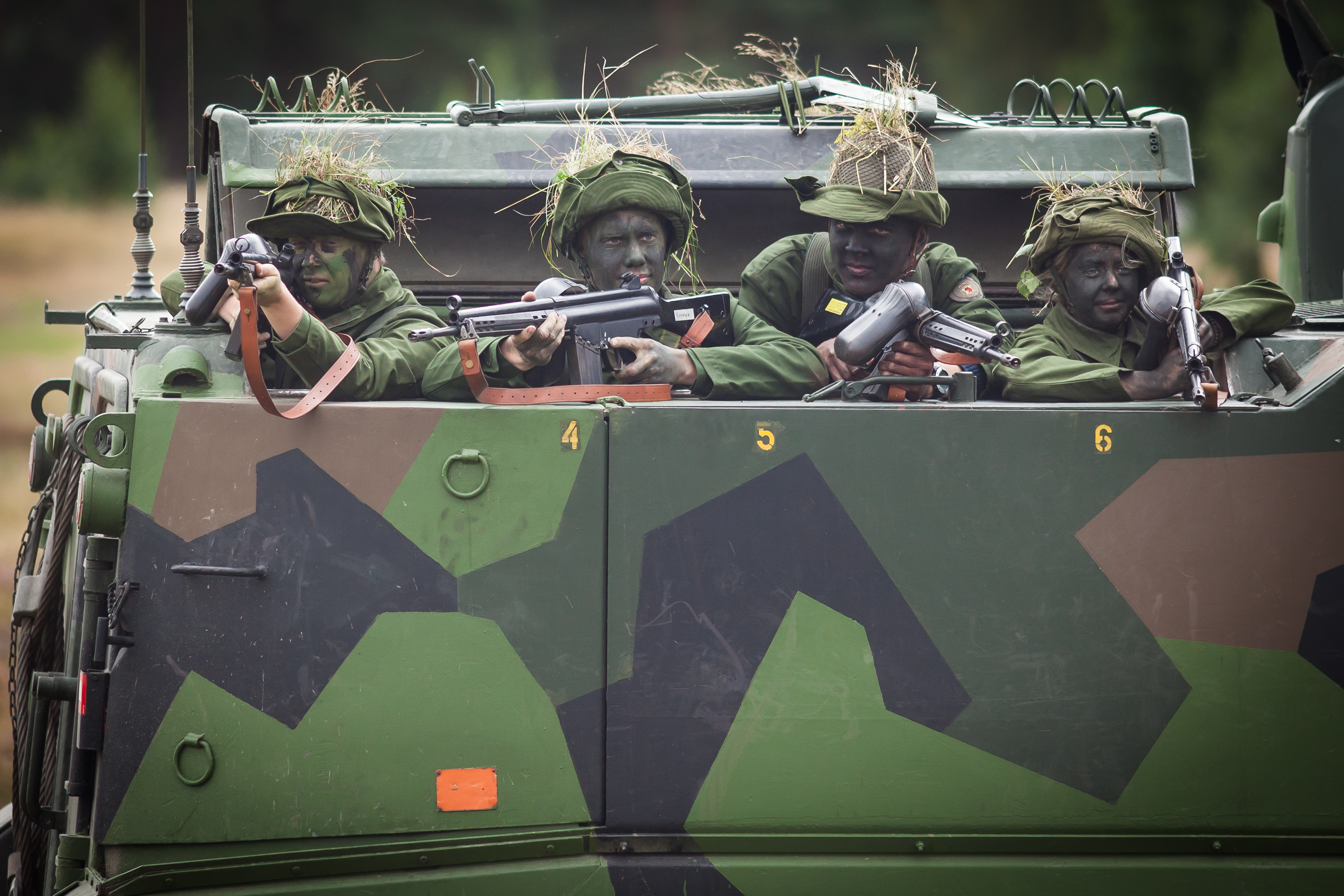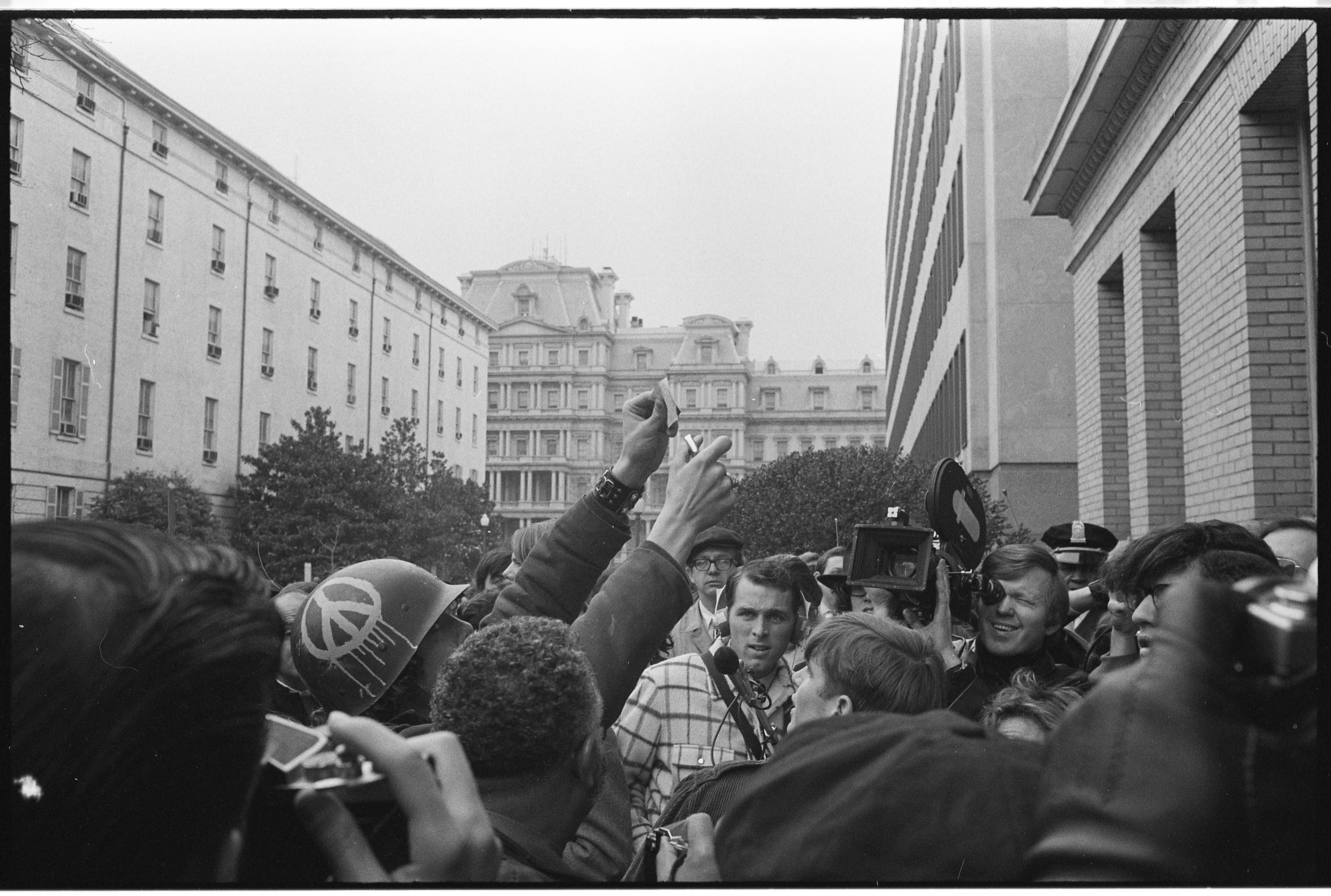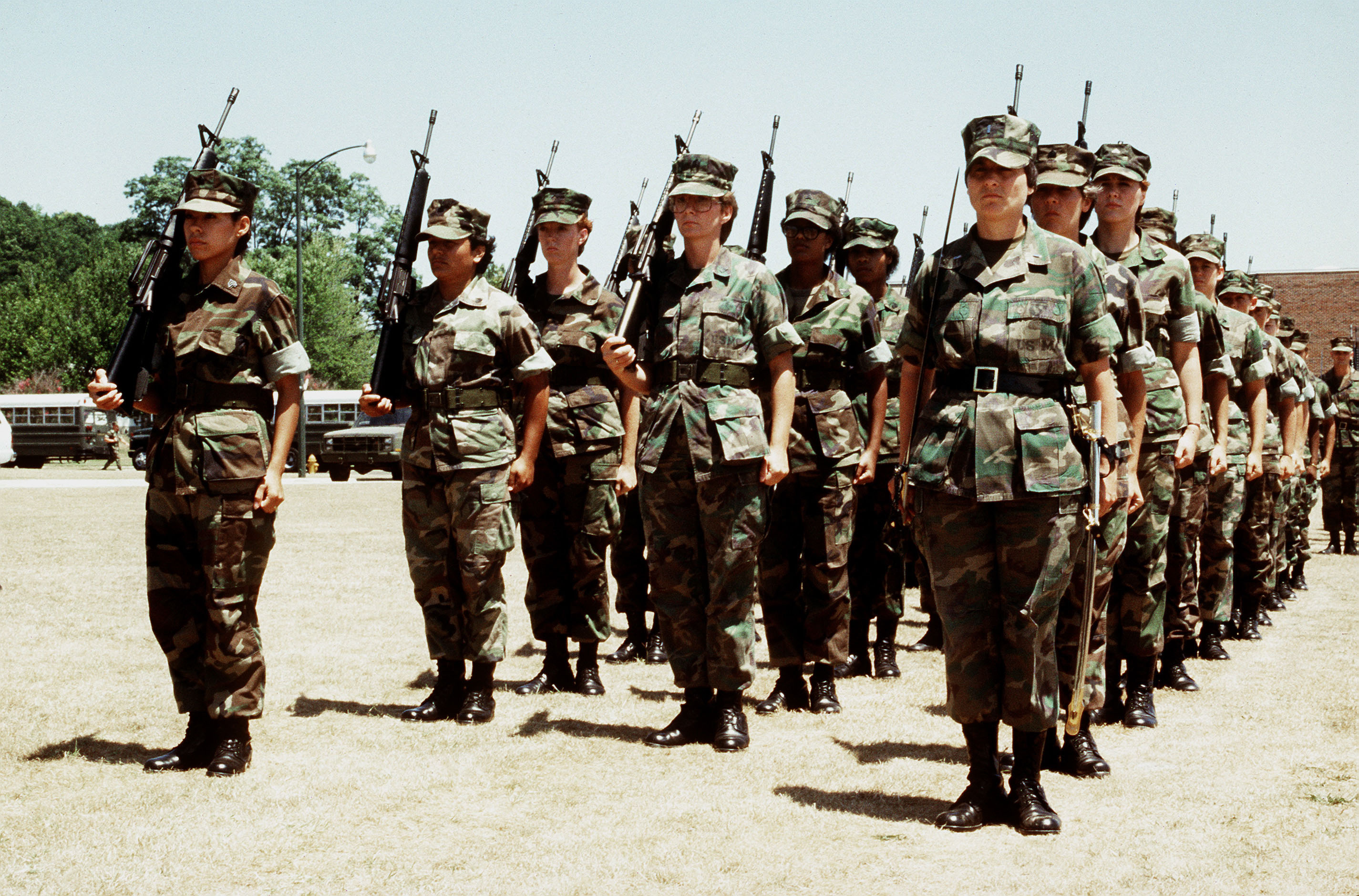14 minute read
Not your Father’s Draft: Critiques of Progressive Conscription
By Amanda Cawston

“Regementets Dag 2014” Håkan Dahlström. Used under: https://creativecommons.org/licenses/by/2.0/
In March 2017, the Swedish government voted to reinstate compulsory military service, or conscription. After suspending the program in 2010, dwindling recruitment combined with a perceived increase in regional threats to security has led the country to reimpose mandatory service.
Sweden joins a number of other European countries that have recently revived or extended the draft, including Austria, Estonia, Lithuania, Moldova, and Norway. Others, including Germany, are reported as considering similar moves.
The Swedish reinstatement is marked by two important features that distinguish it from past conscription programs. First, it is selective rather than universal: out of 13,000 individuals required to complete initial tests, only 4,000 will be selected for mandatory service.[1] According to Marinette Nyh Radebo (Press Secretary to the Minister of Defense), “individual motivation, interest and will should be considered as much as possible” when selecting conscripts. They provide no further details concerning the criteria used if they cannot meet the 4,000 quota with expressly ‘willing conscripts’. However, the suggestion is that they will select individuals on the basis of merit, and are keen to characterize selection as an achievement:
“Producing soldiers is no longer about filling quotas and units. Instead we pay more attention to the quality and skills – the added value – of every soldier. The 21st-century draft is for top achievers” (Kjersti Klæboe, head of the Norwegian defense ministry’s personnel department)
“The selective draft will help us move from military service as something you’re forced to do to something you’re selected to do” (Major-General Klas Eksell)
Second, following Norway, Sweden’s draft applies to both men and women. As Defence Minister Peter Hultqvist notes, “It is important for the military to have a gender equal profile”. These two features, i.e. its gender neutrality and selectiveness, lead Elisabeth Braw to describe Sweden’s program as progressive:
“… it would be a mistake to write off the effort as a rollback of progress. Sweden’s initiative will show the draft in its modern incarnation: targeted, highly selective, and applied to both men and women”
But should we endorse this return to conscription, or is the move subject to the familiar objections to the draft? And, do its purportedly progressive elements introduce new ethical worries? Here, I suggest that not only does Sweden’s program fail to evade these familiar objections, its two progressive elements introduce new causes for worry.
In contrast to earlier practice, which relied heavily on mercenary and professional armies, the “total” wars of the 20th century called for mass conscription.
Conscription was used widely in WWI, WWII, the Korean War, and, infamously, in the Vietnam War, after which it was suspended in the US. Historically, (military) conscription applied only to able-bodied men, and was paired with a set of exemptions (tied, for instance, to student status, physical requirements, or widower status) including a highly contested route for claiming conscientious objector status. In many cases, mandatory service was not limited to periods of declared war, but continued in peace time. Such measures were justified by appeal to military necessity, i.e. the need to have a trained and available force ready in case the nation needing defending, and to civic duty, i.e. that it is a (male) citizen’s duty to contribute to the task of protecting the nation.
Over the last 30 years, Western Europe and the US began to phase out or suspend conscription. Notably, mandatory service is merely suspended in many countries (e.g. The Netherlands, the USA), where states continue to register citizens and have retained the right to reinstate conscription ‘in times of necessity’. These suspensions may seem to reflect growing recognition of individual rights (against the state), reaction against the corrupt nature of the programs (abuse of exemptions), and public resistance to being forced to fight in wars of doubtful legal and moral status. But internally, governments were advised to end conscription for primarily practical reasons. These include the changing nature of war which had decreasing use for amateur soldiers: modern war required specialists and trained professionals, not mass conscription. Moreover, advisors noted that a professional, recruited military would face less internal opposition. Finally, when you don’t have a draft, you don’t have draft-dodgers or draft-protests that undermine the war effort.

“Draft card burned outside Selective Service HQ: 1970”, Washington Area Spark. Used under: https://creativecommons.org/licenses/by-nc/2.0/
In sum, it is likely that the actual suspension of conscription in western Europe and the USA is best explained as a practical measure, where the old model of sustaining a large, but poorly trained and sometimes resistant military force was replaced by a more efficient, recruited, force that was better suited to modern war.
The shift to a recruited military, however, does not entirely escape moral criticism, and may in fact make certain problems worse. For example, in many ways, a recruited military continues to disproportionately draw on disadvantaged segments of society to fill the ranks, and to take on particularly difficult and dangerous work. Whereas this distribution was previously a consequence of (contested) privileged access to exemptions, today it is largely a product of entrenched economic inequalities paired with few employment opportunities. Moreover, many countries have struggled to recruit sufficient staff and have developed various enticement schemes in order to attract higher numbers. Often these schemes trade on further dimensions of disadvantage. For example, some countries offer college education in connection with military service.[2] And, during the Iraq war, the US also offered expedited routes to citizenship to immigrant recruits. The operation of such schemes against the background of pervasive and systemic inequality clearly exploits vulnerabilities and conceals injustice behind the language of ‘choice’.
Furthermore, in their blog entry “Are Soldiers Morally Exploited?” Robillard and Strawser argue that in addition to physical dangers, soldiers are also required to accept certain moral risks associated with killing in war. Soldiers are thus subject to ‘moral exploitation’; they write, “insofar as they are pressured to shoulder additional moral responsibilities, moral deliberative roles, and moral risks that they would not otherwise agree to shoulder were they not vulnerable”. A recruited military thus represents the ‘outsourcing’ of both physical and moral risk, and constitutes multiple dimensions of exploitation.
Of course, many individuals do regard their choice of a military career as uncoerced, and I do not mean to imply that all military personnel feel forced or that they have been duped into service. It would be naïve, however, to ignore the influence of economic factors on military demographics, as well as the role that ending conscription plays in making this situation more palatable to liberal sensibilities.
The move to a recruited military then, is not without problems, both practical (low recruitment) and ethical (exploitation and perpetuation of privilege). For those who think a military is essential for national security, the above points could lend support for universal conscription as a way to more fairly distribute the costs of national defence. In fact, Robillard and Strawser make this very suggestion: that ‘fair and universal conscription’ could be a solution to the existing exploitative practice.
Importantly, conscription would have to be fair and universal to address the exploitation worry, and hence Sweden’s selective model will fail in this respect. In fact, the selective model seems to incorporate the worst features of both models: it retains the exploitative relations and enforces them through direct coercion (rather than relying on the indirect coercive force of economic necessity). Moreover, by selecting a rather small percentage of the population, the program is unlikely to provoke much resistance. The public will be mostly unconcerned with a policy that probably ‘won’t affect me’.
“…the changing nature of war … had decreasing use for amateur soldiers: modern war required specialists and trained professionals, not mass conscription.”
There are three further criticisms to raise against Sweden’s selective conscription.
The first issue is one of economic justice. While performing mandatory military service, individuals are unable to participate in other paid employment. This may result in lower earnings than they would have received over their time as conscripts, but also, reduced lifetime earnings related to the lost time spent on developing a career. Sweden’s selective model thus places an unfair economic burden on its conscripts, who are at greater risk of lower earnings and reduced opportunities than their peers. Moreover, it is possible that these considerations may influence conscripts’ decisions to pursue a career in the military. Conscripts may feel that as they are a year ‘behind’ their peers, and it may be rational to stay in the military rather than try to (re)enter the workforce. Of course, the military does not consider its training an impediment, but rather an advantage that makes one more attractive to employers. However, it is in the military’s interest to try to retain talented conscripts, which seems to conflict with the aim of making conscripts employable.
The second issue concerns respect for persons. Mandatory conscription fails to recognize that people have their own aims, purposes, and desires (i.e. their own ends), but rather treats them as ‘cogs in a machine’. It mistakenly views it as permissible to use people for purposes other than their own. This is a familiar (Kantian) complaint against conscription, expressed for instance by Thoreau: “the mass of men serve the State thus, not as men mainly, but as machines, with their bodies”. While an old point, it has particular force given the kinds of reasons offered in favour of conscription in contemporary discussions. Notably, these arguments appeal only to necessity – that is, that the military requires more soldiers in order to serve its function. Defense Minister Hultqvist claimed “The reactivating of conscription is needed for military readiness”, citing increased regional threats (referring, for instance, to Russia’s annexation of Crimea). This appeal to necessity can be contrasted with other possible arguments for conscription, namely those that trade on the notion of civic duty. The idea that citizens have certain obligations to aid others and contribute to society is arguably less vulnerable (though not immune) to the charge of disrespecting persons. But contemporary support for conscription makes no appeal to civic duty. Sweden in fact expressly distanced its policy from the idea of civic duty (and wisely, as it would be difficult to argue for selective conscription on the basis of a duty that plausibly applies to all citizens).[3] To the extent, then, that proponents of conscription rely on appeals to necessity, they will face the Kantian charge of treating people (conscripts) as mere means.
The final criticism is tied to the relation between conscription and gender equality. As noted earlier, Sweden’s extension of conscription to include women is touted as a progressive, feminist feature. Granted, feminists have opposed male-only drafts for their role in perpetuating restrictive norms concerning women’s role in society and for entrenching gender stereotypes. So, on at least these points, a truly universal draft could help to undermine the masculinist function of the military.
There are four problems, however, with this extension of the draft to include women, and its description as a step towards gender equality.

“DM-ST-86-01724” Expert Infantry. Used under: https://creativecommons.org/licenses/by/2.0/
The first point is that it is unclear to what extent drafting women is driven by genuinely feminist or egalitarian aims, or if the push to include women is better explained by practical needs. The general return to conscription was driven in part by recruiting shortfalls, which had already prompted militaries to look to non-traditional groups including immigrants and women. In Norway, the emphasis does seem to be on the benefits to the military of including women: Admiral Haakon Bruun-Hanssen points out that “Now we have twice as many people to choose from”, and “For several years we have worked to increase the share of women, and with great results. I am sure the new law [conscription] will speed up this process”. So, including women is recognized as one simple way to increase your numbers. But women have also been recognized as filling specific military needs: Norway Captain Ole Vidar Krogsaeter notes that “in Afghanistan, one of our big challenges was that we would enter houses and not be able to speak to the women…Adding female soldiers was an operational need”. While not directly contradicting the stated, egalitarian, reasons, these statements raise doubts about the extent to which feminist concerns are driving the shift.
Second, if one thinks conscription constitutes wrongful coercion, then the fact that women are now wrongfully coerced as well hardly counts as an improvement. This is unlikely to qualify as the kind of equality that feminists would count as success. Being equally subject to an unjust law is hardly progressive.
Third, presenting the extension to women as progressive works to legitimize a problematic practice. By removing the male-only restriction, Sweden has removed one feature of conscription that had attracted criticism, thus reducing the grounds for potential opposition. Proponents can now claim the practice is fair. Of course, this neglects the substantial ways in which the practice, particularly selective conscription, is likely to be unfair.
Fourth, and relatedly, recall that Sweden is trying to cast conscription as an achievement, that one is selected as one of the best rather than forced. But what are the criteria used for selection? Are they unfairly biased towards men? Or, do they reflect the greater value attached to masculine-typed qualities? To what extent does proving one can serve in the military amount to proving one can fight ‘like a man’? In short, extending conscription to women is not paired with a rethinking of the masculine nature of the military and thus perpetuates its embedded values. Moreover, Sweden’s selective model may actually undermine gender equality. Sweden will not employ gender quotas in its selection of conscripts, who are chosen on the basis of ability and aptitude. However, if the selection criteria are not formulated with equal opportunity in mind, then a lower number of selected female conscripts could be taken as evidence for women having lesser abilities, which clearly runs counter to any feminist program. In other words, by pitching conscription as an achievement that is open to women, but privileging masculine norms in selection criteria and military operations, Sweden risks indirectly endorsing the view that most women simply don’t measure up.
This is not an exhaustive list. There are a number of other objections to make against conscription in general, and to Sweden’s proposal in particular. These include worries about provisions for, and interpretations of, conscientious objection. In its revived form, the possibility of claiming objector status under Sweden’s draft is under-publicized and the eligibility criteria are vague. Moreover, Sweden has jailed people in the recent past for refusing to serve, so the concern is not merely hypothetical. Finally, there are worries about possible connections between revitalized conscription programs and nationalism. In Sweden’s case, conscription could be read as part of a nation-building exercise that reflects growing anti-immigrant sentiment.
The above discussion aimed at highlighting the concerns associated with the modern justifications and forms of conscription. In particular, I hope to have raised questions about the move to selective, ‘universal’ (extended to women) conscription that is justified by appeal to necessity. Far from representing progress, these reforms perpetuate inequality, entrench gender norms, and treat people as mere means.
[1] The numbers mandated will increase to 8,000 by 2022.
[2] These include the USA, Canada, and Australia. The UK offers assistance with child care and school fees for members’ children.
[3] Nordgren Christensen is quoted as saying “…the most important reason was the recruitment problem combined with the changing security environment. The underlying task was: we need to improve our operational capabilities. The sociological aspect – military service as a virtue because it means young people do something for the wider society – was not part of my brief”
Disclaimer: Any views or opinions expressed on The Ethical War Blog are solely those of the post author(s) and not The Stockholm Centre for the Ethics of War and Peace, Stockholm University, the Wallenberg Foundation, or the staff of those organisations.


